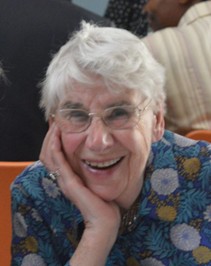Thanks to the generosity of the Kirby Laing Foundation, the Faculty of Divinity is delighted to be able to advertise two doctoral studentships in New Testament Studies for exceptional students proposing to commence their research in October 2026. The naming of these two awards is intended to emphasise the commitment of the Faculty not only to academic excellence but also to fostering a fruitful diversity of background and approach among members of the academic community, and therefore to encouraging applications from suitably qualified candidates from all sections of society.
The Morna Hooker Studentship
This studentship is named in honour of Professor Morna Hooker, the first woman to be appointed Lady Margaret’s Professor of Divinity in the University of Cambridge (a position she held from 1976 until 1998), and the first woman likewise to be elected President of the Studiorum Novi Testamenti Societas (SNTS, Society of New Testament Studies), for the year 1988-89.
Morna Hooker was the first woman to be Lady Margaret’s Professor of Divinity in the over 500 years of its history. Her many publications spanned a range of New Testament issues, including the Gospels and Paul. Many of her books and articles, not least on the Son of Man, the suffering servant and Pauline soteriology, understood through the idea of interchange, remain landmark contributions to the subject. She celebrated her 90th birthday in 2021 and published her most recent book, Old and New, in 2024
The Graham Stanton Studentship
This studentship is named in memory of Professor Graham Stanton (1940-2009), the first non-British holder of the Lady Margaret Professorship (which he occupied from 1998 until 2007) since the Frenchman Peter Baro (1574-96) in the reign of Elizabeth I. Like Professor Morna Hooker, Professor Graham Stanton also served as President of the SNTS (1996-97).
Graham Stanton taught at King’s College, London, for many years, where he was a Fellow, and at Cambridge where he was appointed Lady Margaret’s Professor in 1998. Best known for his work on the Gospels, he also wrote extensively on issues such as text criticism and the origins of the New Testament canon. He was above all else a collaborative scholar, who edited numerous books, and used his role as a leading figure in the field to encourage and support colleagues and students.
Financial value of the studentships
The available funding permits both of these studentships to be fully funded, as long as only one of them is required to cover fees at the Overseas rate. However, each award is open to both Home and Overseas applicants. If both are awarded to Overseas candidates, then one of these studentships would not be fully funded. Additional funding would be sought from other sources in the University to cover the gap between Home and Overseas fees, but success in covering that gap cannot be guaranteed



